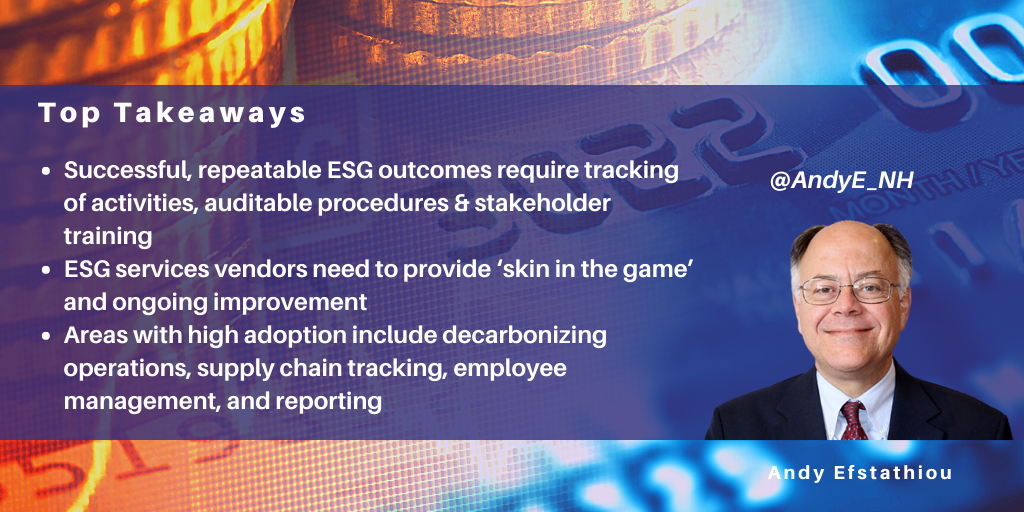posted on Sep 27, 2021 by Andy Efstathiou

Environmental, Social, and Corporate Governance (ESG) is a popular topic of conversation and one that most corporations claim to be actively pursuing. The financial industry is particularly active in ESG, and here I look briefly at what is being done to support ESG initiatives by IT services and BPS vendors who support financial institutions’ operations.
How vendors help banks set up & run ESG activities
Vendors are supporting banks with services including:
- Advisory: engagements to develop a strategy, roadmap, and framework for implementing effective ESG programs
- Solutions: implementing tools, software, and ecosystems to achieve goals
- Integration of ESG/business activities: coordinating and embedding ESG programs into ongoing business activities.
These services are applied to:
- Data: managing, analyzing, and reporting current state and the impacts programs have made
- Technology: identifying and implementing technology to achieve ESG goals (e.g., technology to reduce energy consumption)
- Culture: working with stakeholders to educate and impact behaviors
- Portfolio management: orchestrating and managing ESG programs and assets across the enterprise to reuse and pursue improved outcomes.
Key activities covered include:
- Literature review and best practices
- Analysis: analysis of activities to prioritize for change, plus analysis of outcomes achieved
- Reporting to stakeholders, including employees, customers, management, and regulators
- Tracking the chain of custody and activities for assets and processes to confirm that actual behaviors are as reported
- Employee training: educating employees about strategies, value, and methodologies of ESG activities.
Most vendors offer a wide range of services, but specialize in implementing a few processes (e.g., decarbonization or HR). Activities with a high level of adoption include:
- Decarbonizing operations
- Supply chain tracking for carbon and ethicality
- Reporting (especially for regulations)
- Employee management, ethicality, and diversity.
In terms of challenges, ESG programs have faced pushback for ‘greenwashing’ activities where analysis of achievements has indicated actual outcomes have been much lower than reported, or non-existent. The key to achieving successful, repeatable outcomes is rigorous:
- Tracking of activities and assets with robust chain-of-custody controls
- Compliance with auditable procedures to ensure activities are as reported
- Stakeholder training with buy-in from trainees (achieving cooperation).
Example vendor frameworks & solutions for ESG
Decarbonization: Atos
Atos delivers services to help clients decarbonize their operations. Their offering helps clients to identify their current digital emissions status, build a roadmap to reduce the carbon footprint, and engage employees to support these changes. Key components of the offering include:
- One-day ‘hackathon’ to identify issues and build consensus
- Assessment: identify the current state and build a roadmap to a desired future state
- Dashboard: displays information on the current status and supports setting goals and decision making
- SLAs: Atos contractually commits to carbon reduction targets with a roadmap for how those targets will be met
- Green App: a gamified ecosystem to help employees understand key issues and support developing ideas to solve problems.
Employee & stakeholder training: Infosys
Infosys delivers training services to educate employees in adopting ESG practices across the enterprise. The key to enhancing the training programs that the vendor delivers to clients is the use of existing CX platforms to enhance training effectiveness using tools such as design thinking, knowledge management, and digitally delivered learning offerings. Key to success is special-purpose platforms that respond to environmental change and support change in the enterprise, including:
- Wingspan platform: knowledge and change management
- Meridian platform: sustainability events and community.
Responsible supply chain: WNS
WNS supports clients looking to secure and improve the ESG and operational characteristics of their supply chain with a set of agreements, contracts, practices, and due diligence. Key components of its responsible sourcing offering include supplier:
- Code of conduct: mandatory standards for all participants
- Portal: supplier data repository
- Due diligence
- Contracts: standardization of party obligations, including to ESG
- Evaluation: a periodic review of competency and compliance
- Assurance: supplier self-evaluation
- Awareness: mandatory anti-bribery training
- Diversity: profiling of suppliers
- Governance: audit and management reporting
- Ongoing improvement: benchmarking and ongoing enhancements.
In summary
Vendors are launching tools and offerings to address ESG challenges rigorously for banking clients and others. The programs are effective where there is accountability, consensus, ongoing improvement, and vendor skin in the game. Effective ESG programs will become increasingly important to the heavily regulated banking industry over time.
In my next blog I will look at how the market for these services, including client demand, is evolving.
